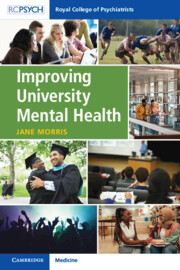Refine search
Actions for selected content:
5 results
Chapter 5 - Healthy Bodies, Body Image Concerns, Eating Disorders
-
- Book:
- Improving University Mental Health
- Published online:
- 08 February 2024
- Print publication:
- 15 February 2024, pp 54-71
-
- Chapter
- Export citation
Chapter 3 - The Transition to University for New Students with Pre-Existing Mental Conditions
-
- Book:
- Improving University Mental Health
- Published online:
- 08 February 2024
- Print publication:
- 15 February 2024, pp 21-32
-
- Chapter
- Export citation
Chapter 2 - Building a New Sense of Belonging
-
- Book:
- Improving University Mental Health
- Published online:
- 08 February 2024
- Print publication:
- 15 February 2024, pp 4-20
-
- Chapter
- Export citation
Chapter 12 - Sexual Behaviour and Gender Identity in Universities
-
- Book:
- Improving University Mental Health
- Published online:
- 08 February 2024
- Print publication:
- 15 February 2024, pp 178-196
-
- Chapter
- Export citation

Improving University Mental Health
-
- Published online:
- 08 February 2024
- Print publication:
- 15 February 2024
